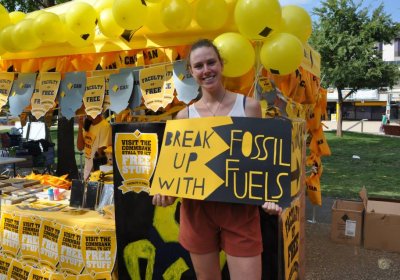 Two examples of development proposals that put profit before people and the environment in Far North Queensland appear to have suffered defeats.
Two examples of development proposals that put profit before people and the environment in Far North Queensland appear to have suffered defeats.
Mining
 Two examples of development proposals that put profit before people and the environment in Far North Queensland appear to have suffered defeats.
Two examples of development proposals that put profit before people and the environment in Far North Queensland appear to have suffered defeats.
As the Galilee Basin project faces legal challenges by Aboriginal and other community groups and international banks refuse to finance it, the environment movement is focusing its campaign on ensuring that the Australian Big 4 banks also withhold finance.
Jay Famiglietti, a senior water scientist at the NASA Jet Propulsion Laboratory in California, made a dire warning in March: there is only one year's worth of water left in the state's reservoir storage and river basins.
Famiglietti said even nature's oldest water backup supply —groundwater — could be gone soon after the reservoirs dry up.
About 38.8 million people live in California, which produces much of the United States' food. California's drought is throwing the ecology of the region into crisis, and ordinary people are scrambling for ways to help.
“Down The Abbott Hole”
By Zelda Grimshaw
Download free
A group of musicians in Cairns, Queensland, have released a song controversially calling for the head of Tony Abbott.
“Down the Abbott Hole” refers to Abbott’s Australia as a bleak and sterile environment, in which fear reigns over logic, and the atmosphere is “cold as ice, black as coal”. The song can be streamed online and was being played by radio stations all over the country just hours after its release.
The Australian Conservation Foundation has released a report titled Australia’s top 10 climate polluters. It reveals that these 10 polluters — and it’s no surprise that most are electricity suppliers - are responsible for generating nearly one-third of greenhouse gases through their production and use of energy.
Indonesia is supposed to have a new liberal leadership with the election of new president Jodo Widodo, the first president since the Suharto dictatorship was overthrown in 198 to be elected from outside the Javanese military/political elite.
But the Australian public, in the furore over the fate of two the Australians and others facing execution, are getting a glimpse of the stance of Widodo — and other influential Indonesian leaders — towards human rights, justice and compassion.
The Queensland Labor government has paved the way for the huge expansion of coalmines in the Galilee Basin.
New Premier Annastacia Palaszczuk announced on March 11 that a deal had been made with Adani and GVK-Hancock to allow the dumping of dredge spoil from the expansion of the coal port at Abbot Point in unused industrial land adjacent to the port.
Palaszczuk said the deal met her election campaign commitment to ban dumping of dredge spoil in the Great Barrier Reef Marine Park or in the Caley Valley Wetlands.
The NSW government’s decision to buy back coal seam gas (CSG) licences in the upper Hunter just before a state election raises more questions than it answers.
The tiny community of Bulga will continue their David and Goliath fight in the courts against a coalmine that threatens the very existence of their village.
The decision to go back to court comes in the wake of the March 5 approval by the Planning and Assessment Commission (PAC) for the expansion of Rio Tinto’s giant Mount Thorley-Warkworth coalmine, despite two court decisions against the project.
Pressure is mounting on Australia’s big four banks over their support for the construction of coalmines in Queensland’s Galilee Basin.
Greenpeace launched a public email campaign targeting the executives of ANZ, Commonwealth, NAB and Westpac, “to publicly rule out financing or advising Adani [Mining] on the Carmichael coal mine and associated infrastructure project in the Great Barrier Reef or Queensland”.
In the lead-up to the first global divestment day on February 14, the University of Sydney announced it will reduce the carbon footprint of its investments by 20% within three years by divesting from heavy polluters.
But it has shied away from divesting from fossil fuels altogether.
The decision follows a sustained student-led campaign, with support from Greenpeace, that has been urging the university to completely divest its investments in fossil fuels.
Voices of the Valley released this statement on February 6.
***
Latrobe Valley residents’ group Voices of the Valley has released new data and analysis regarding probable deaths resulting from the coalmine fire which began one year ago in the Victorian town of Hazelwood.
- Previous page
- Page 22
- Next page









